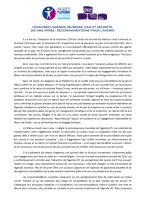
Youth Recommendations for the YPS Agenda
Localising the Youth, Peace and Security Agenda, Ten Years in: Recommendations For The Future
We are pleased to announce the launch of our policy recommendations for the future of the Youth, Peace and Security Agenda!
These YPS Recommendations are the result of a collaboration between the Civil Society Platform for Peacebuilding and Statebuilding (CSPPS) and the United Network of Young Peacebuilders (UNOY). They aim to distil insights from Season 9 of the youth-led Peace Corner Podcast into concrete recommendations focusing on the key importance of local leadership.
The year marks 10 years since the UNSCR 2250, which introduced the Youth, Peace and Security (YPS) Agenda to the world. Despite meaningful steps in recognising and promoting the role of young people in peacebuilding, there is still great progress to be made, especially in recognising, supporting and funding youth peacebuilding at the local level.
During Season 9 of the Peace Corner Podcast, interns at CSPPS and UNOY engaged in insightful discussions with key actors involved in implementing the YPS agenda all around the world. From the socio-economic inclusion of youth in Mali to the teaching of YPS in Northern Ireland, these conversations revealed how the YPS agenda has been pursued on the ground, reflecting lessons and ideas for the future of YPS. From these conversations, nine recommendations were drafted.
The recommendations call for redefining protection from top-down procedures to locally shaped and youth-led practices, and prioritise the localised socio-economic inclusion of youth and support diaspora-driven localisation, among other things.
Reflecting different contexts and perspectives, these YPS Recommendations are an important tool for policymakers, activists and civil society organisations in their pursuit of real, tangible and effective youth participation in local peace and security efforts.
You can find the full text of the recommendations below, also available in Spanish and French.
Pour consulter les recommandations en français, cliquez ici.
Para consultar las recomendaciones en español, haga clic aquí.

